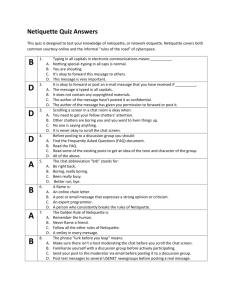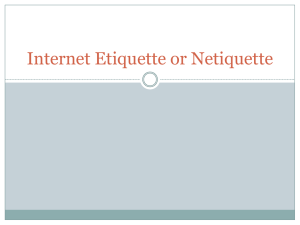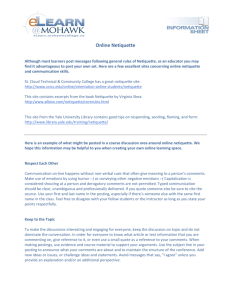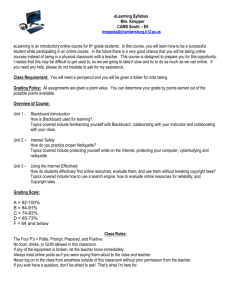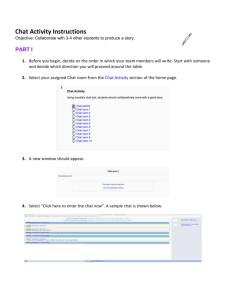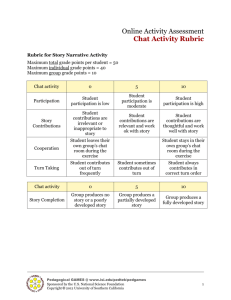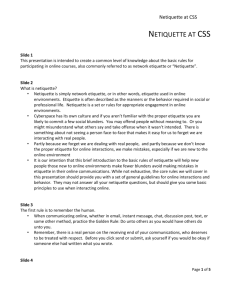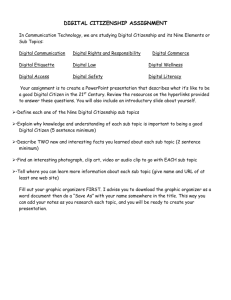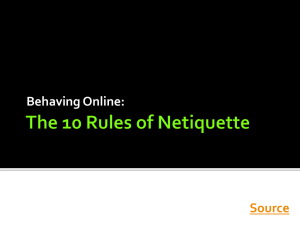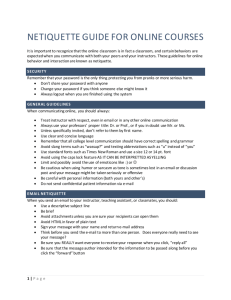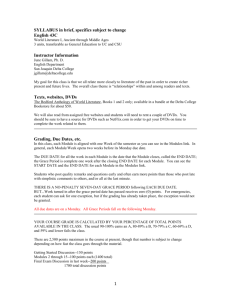Netiquette Quiz for Discussion
advertisement
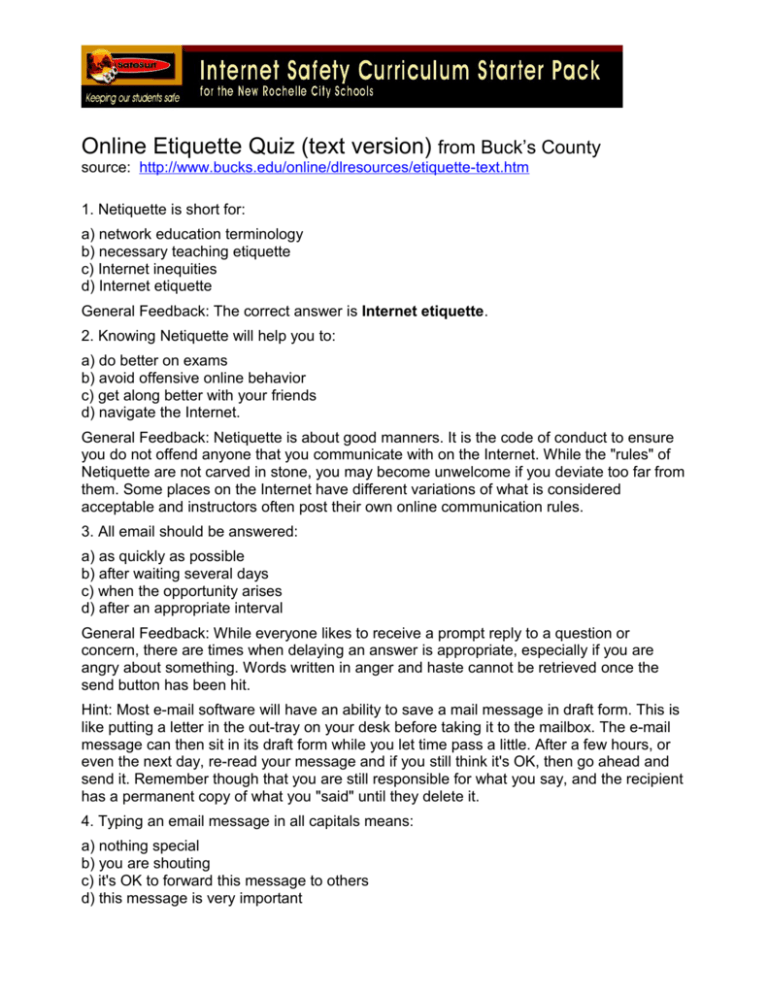
Online Etiquette Quiz (text version) from Buck’s County source: http://www.bucks.edu/online/dlresources/etiquette-text.htm 1. Netiquette is short for: a) network education terminology b) necessary teaching etiquette c) Internet inequities d) Internet etiquette General Feedback: The correct answer is Internet etiquette. 2. Knowing Netiquette will help you to: a) do better on exams b) avoid offensive online behavior c) get along better with your friends d) navigate the Internet. General Feedback: Netiquette is about good manners. It is the code of conduct to ensure you do not offend anyone that you communicate with on the Internet. While the "rules" of Netiquette are not carved in stone, you may become unwelcome if you deviate too far from them. Some places on the Internet have different variations of what is considered acceptable and instructors often post their own online communication rules. 3. All email should be answered: a) as quickly as possible b) after waiting several days c) when the opportunity arises d) after an appropriate interval General Feedback: While everyone likes to receive a prompt reply to a question or concern, there are times when delaying an answer is appropriate, especially if you are angry about something. Words written in anger and haste cannot be retrieved once the send button has been hit. Hint: Most e-mail software will have an ability to save a mail message in draft form. This is like putting a letter in the out-tray on your desk before taking it to the mailbox. The e-mail message can then sit in its draft form while you let time pass a little. After a few hours, or even the next day, re-read your message and if you still think it's OK, then go ahead and send it. Remember though that you are still responsible for what you say, and the recipient has a permanent copy of what you "said" until they delete it. 4. Typing an email message in all capitals means: a) nothing special b) you are shouting c) it's OK to forward this message to others d) this message is very important General Feedback: While capitals can be used to good effect to add emphasis, typing in all capitals in online communications WOULD BE LIKE SHOUTING THE WHOLE TIME! Only type in all caps if you really mean to shout. Hint: To add emphasis to some of your words you can add a _ or * on either side of the word(s) you _want_ to emphasize. 5. It is OK to forward or post an e-mail message that you have received if: a) the message is typed in all capitals b) it does not contain any copyright material c) the author of the message hasn't marked it as confidential d) the author of the message has given you permission to forward or post it General Feedback: In general, you should only forward a private e-mail message when you have the author's permission. If there is any information of a personal nature in the email, it is common courtesy to make sure the author doesn't object to your sharing the information. You should NEVER post a private e-mail message to a news group, bulletin board or mailing list, however, without the author's consent. Some common sense exceptions apply. 6. Using "Smiley-faces" in a message is: a) childish and should never be done b) okay, but they should be used sparingly. c) entirely acceptable General Feedback: Most people find it difficult to convey emotion through the written word, especially when trying to be brief in their writing. It is acceptable to use "Smileys," as they help the reader know whether you are joking, angry, sad, or sarcastic. Hint: One way to take the "heat out" is to show what you mean by actually writing it in. At the end of your sentence put in <joke> or <cheeky>. <g> is simple and quick, and means <grin>. These additions help people to know what you mean. Some examples of the more commonly used Smileys are: :-) Happy :-( Sad :-| Stern ;-) cheeky, winking :-D Laughing :-O Shocked 7. A flame is: a) an online chain letter b) a post or email message that expresses a strong opinion or criticism c) an expert programmer d) a person who consistently breaks the rules of Netiquette General Feedback: Flame messages are posts or email messages that express a strong opinion or criticism. They are acceptable when their purpose is to correct misinformation or bad behavior, or to add something of value to the topic at hand. Flames that simply insult others are bad netiquette. 8. Chain letters sent via email should be: a) forwarded to as many people as possible if they contain information about computer viruses b) forwarded to just your friends c) checked for authenticity and then forwarded d) discarded the way you do paper junk mail General Feedback: Chain letters can be just as much a nuisance on the Internet as they can be on paper. You should never pass on a chain letter without checking its authenticity and in almost all cases it is best to not pass them on, as they generally only serve to clog up Internet traffic. One rule of thumb you might use - if it says "FORWARD this to everyone you know" - DON'T. 9. You should worry about grammar and punctuation: a) Only when you are sending a message to your friends b) Only when you are sending a message to your classmates or instructor c) All of the time d) Whenever you have the time to pay attention to it. General Feedback: While it may be acceptable to tap out quick messages to friends without paying attention to grammar and punctuation, when sending email to your instructor or fellow students you should pay attention to those things. Good practice would have you pay attention to it all of the time. Example - which of the following do you find more readable and therefore more likely to get a response from: DEAR PROFESSOR I AM HAVING DIFFICULTY UNDERSTANDING THE CONCEPTS LAID OUT ON PAGE 185 I WILL BE ON CAMPUS THIS TUESDAY NIGHT FROM 6-8PM WILL YOU BE AVAILABLE TO REVIEW THIS WITH ME DURING YOUR OFFICE HOURS ON TUESDAY NIGHT THANK YOU JERRY Dear Professor, I am having difficulty understanding the concepts laid out on page 185 of our textbook. I will be on campus this Tuesday night from 6-8pm. Will you be available to review this with me during your office hours on Tuesday night? Thank you, Jerry 10. Spamming means: a) posting a message that contains graphic descriptions of something really gross b) sending in lines of nonsensical garbage in chat conversation c) spilling the juice of meat-byproducts into your keyboard d) posting or e-mailing unsolicited advertising messages to a wide audience General Feedback: Spamming is posting or emailing unsolicited advertising messages to a wide audience. Essentially, spams are widely posted junk mail. Spamming is extremely bad Netiquette and will provoke the indignation of the online community. 11. The above questions centered on email. Other places where you communicate using the Internet that these guidelines might apply are: a) bulletin boards b) discussion forums c) list servs d) chat room e) news groups f) all of the above General Feedback: When you are communicating in discussion forums, bulletin boards, list serves, chat rooms, and newsgroups, netiquette becomes very important as you may be talking to people on a global scale. Also, remember you are communicating publicly. Everything you say is visible to everyone else who is subscribed to that list, forum, or chat room. With newsgroups, bulletin boards, and discussion lists your words may be available for a very long time, so think carefully about what you write. 12. Scrolling the Screen in a chat room is OK when: a) you need to get your fellow chatter's attention b) you are bored by the "conversation" and you want to liven things up c) no one has said anything for 60 seconds d) it is never OK to scroll the chat screen General Feedback: It is considered extremely poor etiquette to scroll the chat screen at any time. 13. The chat abbreviation "brb" stands for: a) be right back b) boring, really boring c) been really busy d) better run, bye General Feedback: The correct answer is be right back. This is a common abbreviation used in chats to let your fellow chatters know that you have been temporarily distracted from the chat conversation (ie. the phone rings, someone starts talking to you in the "real world"). 14. The Golden Rule of Netiquette is: a) remember the human b) never flame a friend c) follow all the other rules of Netiquette d) a smiley in every message General Feedback: The correct answer is remember the human. When communicating via computer, it's all too easy to forget that those are real people out there with real feelings and egos. If you wouldn't say something to their face - you should not say it over the internet. It's OK to express your opinions, but be sensitive to the feelings of others. Hint: Think about how you would like people to treat you when they are communicating with you over the Internet and remember that no matter where you are (online or in real life) you are the only one that is accountable for your actions.
